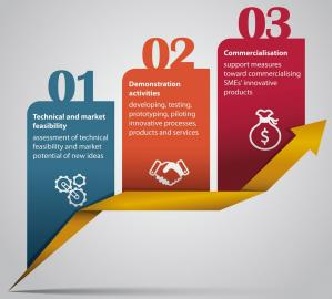 newsitems
newsitems  CoE Digital/Media Head Malinowski to EuroFora on French President Sarkozy Internet move on G8 Summit
CoE Digital/Media Head Malinowski to EuroFora on French President Sarkozy Internet move on G8 Summit
CoE Digital/Media Head Malinowski to EuroFora on French President Sarkozy Internet move on G8 Summit
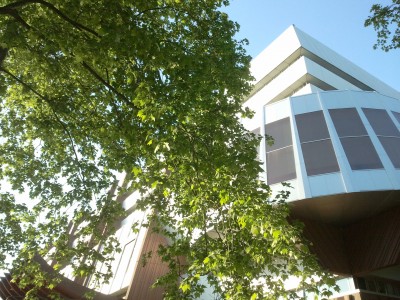
The Head for Media and Digital Society in CoE's PanEuropean Organization of Human Rights, Democracy and Rule of Law, Jan Malinowski from Poland, (the next EU Chair : July - December 2011), speaking to "EuroFora" on French President Nicolas Sarkozy's initiative for the creation of pluralist consultative bodies composed of various Internet players, starting by France's CNN (National Council for the Digital sector), in order to stimulate debates and prospective thinking for some core Principles due to be discussed and eventually decided from the forthcoming G-8 Heads of State and Government Summit at the end of May 2011 in Deauville, welcomed the move as "Right", provided that it will have "correct" and balanced results, more and more needed today, given recent developments affecting the Internet, as he said. (See infra).
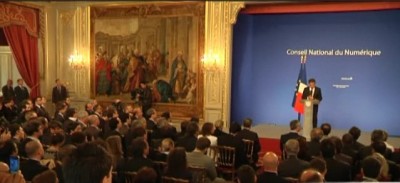
- "A 1st Step in a Policy with an International Dimension, that we are going to do with the G-8" Summit at the end of May, could be to initiate the creation of Pluralist Consultative Fora, from various representatives of the Digital World, able to foster Debates and provide Advise to Decision-makers on Measures concerning fundamental aspects of the Internet, etc., which might stimulate a larger movement towards the eventual establishment of a kind of Global Council of the Digital World, declared earlier in substance French President, and 2011 G-8/G-20 Chairman, Nicolas Sarkozy, after anouncing also a "e-G8 Forum" in Paris on 24-25 May, at the eve of the Heads of State/Government Summit in Deauville (26-27 May : See analytically infra).
----------------
- "The Time is always Right, if ...the Outcome is Correct", carefully but positively replied to "EuroFora"s question on Sarkozy's Internet-related move on the G-8, the Head of Media and Digital Society of the CoE, (which has recently prepared a Corpus of "Principles" and a Draft "Treaty" on the Internet, in addition to its earlier Legal work on the matter, as a recent International Conference on "Internet Freedom", earlier this Month in Strasbourg : See previous "EuroFora"s NewsRsports).
- Indeed, "I think that some matters have made it (recently) more crucial that they need to look into ways on how to preserve the Fundamental Values (in the Internet) so far". F. ex., "things like the e-Aggressions blocking Internet sites/Networks, the incident where Internet was cut off in Armenia while passing through Georgia, things of that sort, or the way that Wikileaks was excluded from some Hosting Services in certain countries, and so forth, .. these are issues that have put more clearly on the Agenda the Need to look after the manner (that) the Internet is managed, and, still quite, for the CoE it's much more obvious that there are a number of Questions that it's Necessary to look into", Malinowski observed.
- Currently needed moves might take a form of a few basic, core "Internet Governance Principles", recently prepared by the CoE and presented at the April 2011 International Conference. However, moreover, "it's not excluded that we could also go at another Level and work for a Treaty. But this has to be seen". Already, recently, "one of the Documents which have been considered in the (recent, Strasbourg) "Internet Freedom Conference, was about what could be, in the Future, a (CoE's) Committee of Ministers Recommendation setting out amendments to preserve the Integrity, Universality and the Functioning of Internet accross Borders, suggesting to recommend to Member States to commit themselves to certain things, set out in a Document, in order mainly to "protect the Integrity, Universality and Openess of the Internet". "That could be the Basis of Discussions in the Future in respect of National Laws", he indicated.
- Thus, concerning the G-8 2011 French Presidency forthcoming moves, (See supra), "if CoE is invited, we'd be Glad to participate", the competent Director of the PanEuropean Organization (which has Russia as full Memlber and has also established Special "Observer" Links for the USA, Canada, Japan, etc), declared to "EuroFora". - "We (CoE) have been working on issues related to the Internet for a number of Years now", (in fact : As early as since the 1980/1990 pioneer Decades, as far as CoE's Experience on Digital matters and Internet is concerned, setting Legal Standards on "Personal Data", Protection of Digital Systems, Access to Internet, Fight against "Cyber-Crime", etc). + "But, what is important about the CoE's work, is that it brings in the Human Rights' echo. Stemmig from that, there is a number of issues that we have been addressing, and any (eventual) Internet Governance decisions should, normally, take into account of this aspect. That is paramount for CoE, which is destinated to uphold Human Rights (in general), which applies of course also to the Internet", Malinowski stressed as far as the well-known Specific Added Value of the Strasbourg-based PanEuropean Organization is concerned.
- But, even if "CoE certainly has a role to play, this doesn't exclude other Organization or Fora". However, "f.ex. IGF (UNO's "Internet Governance Forum" : the nex scheduled for Nairobi/Kenya, on September 2011), as it stands today, is just a Discussion Forum, which doesn't take Decisions", he observed. On the contrary, "in the CoE, there are Mechanisms able to take Decisions, f.ex. in the form of Committee of Ministers' Recommendations, setting out Standards and providing Guidance to (CoE's) Member States on the manner that Human Rights should be upheld in this or that concrete environment, etc. And "on Internet, it's not excluded that we (CoE) could also .. work for a Treaty". This goes, "as I said, in advance of your question, always implemented from the Perspective of Human Rights, Freedom of Expression, Right to Access to Information, the protection of Privacy, the protection of Property, and so on, including also all other Rights stemming from the European Convention on Human Rights and its Protocols, f.ex. Education, Right to Association, etc. and preserving the Integrity of the Internet as a block .. in relation to Blockades or e-Aggressions", etc., he added.
+ Concerning the ways to make f.ex. China's eventual participation possible, in addition to other Non-European big Global Players (USA, Canada, Japan, etc), Malinowski flexibly observed that, "well, in all meetings, until now, we (CoE) invite people from Civil Society or Academia of China, (i.e. Universities, as f. ex. during the recent Internet Conference where a Young Professor from Beijing Universiy was present : See her statements to "EuroFora" in DraftNews to Subscribers/Donors), but not yet on Governemental level". However, "we (CoE) haven't excluded anyone (NB), and they (f.ex. even Chinese Government Officials) would be Welcome to participate in our discussions" in the Future, CoE's competent Official declared. Naturally, "if there was Negotiation f.ex. for a new (Legal) Instrument, that could be done only through CoE Membership", he acknowledged. But, "Observer (States) can participate, and a number of our (CoE's) Observers are interested parties in the Internet, they are very relevant, they are doing things : f.ex. USA, Canada, and so on". Thus, "I wouldn't exclude that, if needed, we (CoE) would open more Broadly Consultations" with such Key Non-European Partners, he suggested. - "But, at any event, there are (at least) free to participate in (CoE's) Consultations, which are open also to European Citizens", as he indicated.
- The main thing for Strasbourg's PanEuropean Organization's overall Strategy is that "since (CoE) Member States have committed themselves to uphold Freedom of Expression, the Right for Access to Information without Frontieres, etc. as this topic is natural to the Internet, our organisation has strong interest to ensure that they (Member States) live up to that commitment, and that means f.ex. preserving the Cross Border Flows in the Internet" (etc), Malinowski reiterated. "The Goals that we (CoE) propose and pursue are based on Human Rights, and the importance of the Law-making is to ensure that Internet Freedom is consolidated, it's not necessarily Rule-making about Prohibitions and Limitations". Nevertheless, "of course, Freedom of Expression is associated with Responsibilities and so on. But the Objective is to ensure the maximum of Rights and Freedoms, while having the Minimum of Restrictions, and, at the same time, ensuring the Security that People are entitled to expect from the Internet. These are Needs to which we must respond. That's part of our (CoE's) work", he concluded.
+ Meanwhile, the forthcoming UK Chairnmanship of CoE's Ministerial Committee, from November 2011 to May 2012, seems also willing to start moving on setting at least some basic Internet Rules, as Foreign Secretary William Hague reportedly declared recently, cited by CoE's Deputy Secretary General, Mrs Maud de Boehr-Buquichio in her inaugural Speech at the recent "Internet Freedom" International Conference in Strasbourg, (comp. earlier "EuroFora"s NewsReports).
----------------------------
* CoE's approach seems to fit well the main thrust of Sarkozy's statements on his Internet plans, as G-8 2011 Chairman, particularly when he pronounced himself against "absolutely unacceptable Violations of Freedom of Expression, as those that we saw in the Arab Spring", and, more largely speaking, ensured Cyber-Dissidents both in Europe and from all over the World that, thanks to Internet, "those who revolt" against grave oppression and/or injustice "are not alone". (See infra).
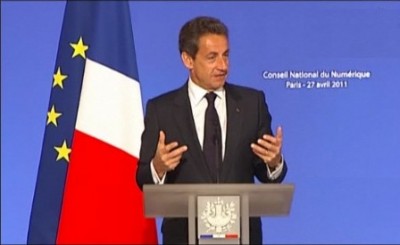
- Internet "Forums multiply our capacity to Debate, hold Discussions, exchange views", stressed President Sarkozy, fully in line with "EuroFora" projects' credo, (that he has officially encouraged from the start by writing)...
- "The issues raised by Internet become eminently Political", and "question us on the way that we must organize our Social Life in all its dimensions", Sarkozy stressed. "Even more profoundly, .. by changing the way according to which .. People develop their Personality in InterActivity, Internet affects all components of Identity, not only of a Country, but (even) of Personal Identity", he added. "In consequencen, Changes brought by Internet ... affect all Civilisation", he concluded.
- "That's why Censorship at the Internet, or Collective Deprivation of it, become an Unacceptable Violation of a People's Freedom of Expression", Sarkozy denounced. This is what "we have recently seen in the Arab World", the French President pointed out, referring to Internet, Phone and other Communications' black-out and/or Persecution and Jailings notoriously imposed in some 3rd Mediterranean Countries, from Libya to Syria or Turkey, etc.
- "For a People, the possibility to Communicate via Internet lowers the threshhold of tolerance to Oppression", also because "by Internet, whoever revolts can become Aware of the fact that he's Not Alone, that he's not obliged to feel fear when he walks on the street and when he has to face a physical oppression", Sarkozy stressed. F.ex., "France denounced the Phone and Internet Cuts by the (former) Egyptian Governement on January 2011", he reminded.
----------------------------
- "What Policy should be set up, in front of these profound Changes ? What is the State's role in these Dynamics, supported by Businessmen, Private Sector and Civil Society ? ... These are extremely Heavy Questions", he wondered.
- "I think that States' role, at any case, cannot be to harm Internet's Development : This would be Morally Unacceptable and Economically senseless. States' role is not to build Maginot lines against Cyber-Dissidents or to ignore that Internet is an incredible area of Freedom", Sarkozy acknowledged. - "But States' role isn't, no more, to let things go astray, allow behaviors which don't respect our Fundamental Principles", he warned. Nevertheless, "I believe that Internet is an area without limits, whose borders cannot be regulated only by Law, or Authority rules/links, because Law, Regulations, Authority, can be overcome at any moment by Technologic Innovation and by the way to use it : (F.ex.) a New way to get informed, to buy and sell, to exchange, etc", Sarkozy observed
=> "In these conditions, I think that States' role is double : 1) States must, at first, oblige to respect the Rule of Law and to defend our Principles and Values". 2) "Moreover, States' Responsibility is to encourage Rule of Law's Evolution, in order to integrate Technologic Innovation's benefits. But, as this goes very Fast, Rules shouldn't be always in delay"..., he critically said.
- -I.e., as "I say to businessmen : Stimulate your Creativity and Imagination, not in order to break a limit or violate it, but rather in order to step on that limit and jump over it", as he colorfully described the move.. F.ex., the 2009 controversial Law "HADOPI" is "an imperfect solution found for the categoric need to defend Intellectual Property and Creators' Rights" : It's the "essential issue" of the "Copyright" and of "Authors' Rights". "But, .. I expect the Day when a Businessman will find another way to guarantee a Distribution System allowing to respect Intellectual Property and Authors' just award", Sarkozy flexibly declared himself open for Future changes at the Horizon.
- Speaking on Concertation with actors of the Digital World , Sarkozy observed that, "in order to Imagine the Future, we must Work Together : ... We need eachother : ... That's why I wanted to create the National Council for Digital" issues, because "we can't stay just 2 separated worlds which ignore eachother, are anxious and don't know eachother. We must try to associate People". That's why "I wished to gather around (several) competent Personalities of the .. Internet, in majority Businessmen, so that for any Project of Legislative or Regulatory measure, which could affect Digital Economy, the Government will be obliged to ask your Opinion, and will benefit from the Enlightenment which will come from that".
- Describing how such Consultative, participatory Mecanisms should work on Internet issues, the 2011 G-8 Chairman observed, in the concrete example of French CNN, that "it's normal to disagree ... in a Democracy", but "it's important that nobody can claim that he was hindered to express his opinion, present his arguments". Because, "what angers People is .. to be hindered to present their arguments, defend their views, explain their expectations", (i.e. be Free to Debate), Sarkozy rightfully observed. Thus, CNN is due to "provide the views of a Professional World, largely Young, (with "some exceptions", as he observed, seeing some White-hair participants among Web's Pioneers) ... Free and Enterprenerial", by "giving Advice", but also "by formulating Recommendations, because you don't have to wait for anyone to ask you something" : On the contrary, it's better for you to "be proActive, to make Proposals on anything which might favor Internet's development", he officialy declared. "The Government is ready and willing to hear what you have to say", and "Government's decisions should be enlightened by CNN's thoughts and by the Dialogue with the Digital Sector", he promissed. Meanwhile, "naturally, CNN will be Free on its Opinions, Free on its Decisions to Act", or not, and "to choose its Agenda and Timetable". It will also be Free to elect its own President among its 18 initial Members, and "free to organize itself as it wishes" : F.ex., its Membership could be extended "if someone was forgotten, or if there are People who want to participate : Why not ?", Sarkozy openly said. "The only thing that I want is to work in an Open manner, Together with all Actors of Internet's ecosystem, in all its Diversity : (F.ex.) Associations of Consumers, of Children care, of big Corporations ("national or international"), of businessmen and developers, etc", and "to create a close Dialogue with the Legislator", (i.e. the Parliamentary Assembly), he pointed out.
----------------------------
"International Policy"
-------------------------------
- But, "the creation of CNN (the French National Consultative body on Digital issues) must be considered as a 1st Step in a Policy which has an International Dimension, and that we are going to do with the G-8" at the 26-27 May Heads of State/Government Summit at Deauville, Sarkozy explained on the occasion of the inauguration of this New Consultative Body.
- "What I really think, ... is that" the creation of "CNN (the French National Council on Digital" issues), wouldn't have any meaning if it was restricted just to the National Territory alone". Because "it would be somehow strange to prepare a French CNN due to represent a Digital World which isn't Global, while, in fact, the Digital Society is, by definition, Global and without Borders", observed the 2011 G-8 Chairman.
- Therefore, "I'd see only advantages if CNN created" a kind of stimulus in order to "initiate other Countries' CNN", since "this French Initiative would be meaningless if it wasn't destinated to be applied, sooner or later, also in the USA, in Germany, in Japan, etc", Sarkozy declared. F.ex., already now, "in the U.S. they are watching what we (France) are doing, in order to decide how they are going to set up, also themselves, a beginning of (Internet's) Organization", he noted.
- Thus, "we could even have a kind of (Global) CNN of all CNN", i.e. a sort of World Council for the Digital World, Sarkozy suggested, speaking almost 1 Month before the Deauville G-8 Summit...
- That's one of the reasons for which "I took the Initiative to put the Internet, a Global phenomenon, in the Agenda of the G8 Heads of State/Government's Summit at Deauville", after succeeding to convince all Heads of State/Government, both those who are (notoriously) fond of the Internet, or not", and that wasn't easy", he noted.
- Before that, " at the eve of the (G8 Heads of State/Government) Deauville Summit, the 24 and 25 of May, we shall invite in Paris several Eminent Representatives of the Internet (throughout the World), who will participate in a "e-G8 Forum", "representatives of which will comme and speak directly to the Heads of State/Government" at the Seaside ressort, Sarkozy openly anounced.
- The main aim is to "try to develop a Global Thinking, on Sensitive Issues, about which we have to speak", the G8 2011 Chairman stressed : "At least, let's define the main Questions", and let's "find the way for a Dialogue", he proposed.
- F.ex. "on Web Fiscal issues"; I don't think that you're in favor of Tax Evasion, ("at least not officially", he added, making CNN Members laugh). So, "is it normal for a State which Funds all (Communication) Infrastructures, to be hindered to raise simply a question on Jobs Created, and/or Taxes assumed, etc., while a (Foreign) Corporation outsources all its Fiscal matters at another side of the EU, only because it asks lower Taxes ?", "Isn't that illegitimate ?" , he rightfully wondered. As for Taxes, between what might endanger the creation of New Internet Businesses, and No Tax at all, isn't there something to Invent ?", Sarkozy suggested.
- On Web Deontology : -"I am full of demads by Associations defending Users" of Internet, raising "questions of Morality, Fight against Pedophilia, etc., which are impotant. But, "Freedom is the Rule, it's the Foundation. However, can't we agree together (at least) on a Minimum of Corpus (of Principles), so that, for the shake of Internet's standing/reputation, you don't have to justify yourselves for the acts of people who are Strangers to you ?", he wondered.
+ Moreover "I believe in Europe, I'm a concinced European, but I would like for my Country to have the Best possible Regulation". Therefore, "the question must be raised on why some prefer to develop, at least a part of their activities, elsewhere".
- And Sarkozy said that he was open to any eventual suggestion about "finding some (if necessary "innovative") ways to protect Authors' Rights" otherwise than it was already done by the "Creation and Internet" Law, known as "HADOPI" of 2010, (which had notoriously provoked contradictions mainly because of warnings and sanctions for repeated illegal downloading of stray copies, but also contained Funding for On-line Media, which was hastily accaparated by a few old-time, traditional Media oligarchs, "Socialist" Critics of the Government who nevertheless paid them, and their pals)... He was later obliged by some misinterprations to explain that he remained attached to the principle of the protection of Creators by sanctions against illegal copies, but also open to eventual ideas to protect them otherwise in the Future.
+ Moreover, even the question of "Security vis a vis Terrorism, is not a Tabou", he pointed out.
- As well as "the issue of Funding and of Independence for a number" of Internet actors, on the occasion of which, Sarkozy observed that "2,5 Billions €" from French Government's "Great Loan", have been "earmarked for the Digitalisation of Contents, "e-Health", and a Number of (other, Internet-related) Initiatives that we are Ready to undertake" from 2011, as he highlighted.
4,5 Billions € from the Great Loan have been recently earmarked for the Digital Economy. From this sum, at least 1,4 Billions € are due to boost investment in the development of New Digital services, utilisations and contents, including the recent (18 March 2011) call for projects on the valorisation and digitalisation of Scientific, Cultural and Educational contents, E-education, E-Health, Digital City, etc., as well as 800 Millions € for Research and Development of innovative utilisations. This is in addition to the early 2010 funding of on-line Media, which was notoriously accaparated too fast mainly by few old, ex-traditional Media former bureaucrats of a "Socialist" trend and their pals : the same which had previously delayed the entry into force of an initially March 2009 Draft Bill on the "Creation and Internet" known as "HADOPI"..
(Comp. "EuroFora"s NewsReports from the 9/2009 Paris Conference on "the Future of Digital Economy", and from the 12/2009 Declarations by President Sarkozy, near Strasbourg, on his decision to include Digital economy in the funding from the 35 Billion-strong "Great Loan", as well as Culture Minister Frederic Mitterand's 10/2010 statements to "EuroFora" in Strasbourg including Web Media).
- "I trust the Digital World" to be able "to build itself something (f.ex. a Corpus of Principles : Comp. Supra), which, otherwise, would have been viewed as imposed from an External Intrusion", Sarkozy concluded.
---------------------------
+ "Economic Motor"
-----------------------------------
Sarkozy being a profoundly "Political" player, his own statements' Strategy and Global view naturally appeared focused mainly towards a Socio-Political and Democratic, Dynamic Vision of the Digital era, for which he naturally wants to create some solid Economic foundations for the Future :
- "Internet is everywhere, today, and profoundly Changes the World that we knew" before, he added? "Few phenomena have such consequences on History, that they affect and profoundly change everything that we know, obliging us to Think the World in a New way : Nothing escapes today from the Changes that Internet and the Digital" world "bring to our Lives, personal and Professional".
- "Internet, today, it's not only a Technology or a Media, but a Sector of Activities", which "has become essential for Economic Growth, since it contributes to more than 70 Billlions € in our (France's) GDP", and, "in terms of Added Value, it's already More than Key Sectors such as Energy or Transports", Sarkozy observed from the outset.
- "Its Force is that, by spreading around, Internet became a Motor for Growth also of Other Sectors of our Economy : More than 3/4 of the Added Value created in our Digital Economy doesn't come from new actors, but by Traditional Businesses which have developped On-Line Activities"
- "Therefore, Internet is much more than a Domain" of activity : "It's a Transformation force, which spearheads all our Society, and with an accelerating contribution to Economic Growth and Employment".
- "I was astonished to find out.. the Fact that Internet contributed for + 25% of our (France's) Growth during the two last years, and created more than 700.000 Jobs net these 15 last years" In France. "2 Millions" of People "buy Today on Line (+ 3 Millions in one Year), for a total amount of more than 31 Billions € in 2010" in our country, he added.
+ "But Busines' life is often profoundly changed by the arrival of New Jobs, where Digital is seen, sometimes, as a Threat by those who don't master well its tools. The "Digital Gap" isn't only a question of Equipment and Infrastructure, but also a question of Training". .. "And the State itself doesn't escape from Internet's profound changes, which oblige it to re-think some of its Structures and Missions", f. ex. to "develop On-Line Public Services", "Transparency", and "exemplary Democracy", etc., Sarkozy reminded, anouncing that he "asked from the Government to create a Gateway for Public Data on-line", "because the issue of Data Bases' Access is absolutely central", and "will allow to Developers and Start-ups to Invent New Services for Citizens".
- In front of such changes in both the Private and Public sector, "as Actors of Internet, you couldn't accept a Social and/or Territorial Exclusion in its name", he pointed out to CNN Members, as far as effective Access and Use is concerned
-----------------------
- In fact, "Internet partly fullfils what the Enlightenment's Philosophers had aimed at, with Diderot's and Alembert's Encyclopedias : Make everything Accessible to the greatest possible number" of People.
- But, "the abundance of information sources is not enough in order to form a Judgement and a Critical thinking", and "underlines (also) the need to Organise Knowledge according to Priorities", as well as "an even more fundamental Dimension.. : That of Socialisation", since "Internet re-designs the way that we Meet other People, that we exchange with them, that we Contact" them, he observed.
-------------------
Concerning the initial Composition of France's CNN, (which is also conceived as "a 1st Step towards an International Policy" : See supra), Sarkozy observed that it's free to involve also other Internet players in order to enlarge its representativity. But he denounced the politically moticated "Sectarism" of some (apparently a few "Socialist"-minded individuals) who allegedly refused even to participate in a national body made for pluralist debates and "dialogue".
- Replying in advance to the question why Internet "Content Editors" are not sufficiently included in the CNN, Sarkozy observed that this was simply due to the fact that "they are already represented", with "their own representatives", and, moreover, "I don't want for CNN to become just another area of Old Confrontations", as he said, apparently pointing at the HADOPI 2009 Law's innovation for "On-line Editors", which was notoriously delayed at first (from March 2009 up to December 2009-January 2010), and afterwards accaparated mainly by a few former Traditional Media "Socialist" Oligarchs and their pals... "Consumers are also represented elsewhere", he added.
- CNN, a "consultative entity, embodying the Diversity of Internet, and more generally: of Digital Players", destinated to "advise the Government on issues related to the Digital" sector, is entitled, not only to "issue, at the Government's demand, Opinions on Legislative and Reglementary draft Bills which may affect Digital Economy", according to a Decreet presented by Industry Minister Erik Besson and endorsed by the French Government earlier today, but also, "to make Recommendations in favour of Digital Economy's development, and to contribute to the development of Prospective Thinking in this sector", i.e. even at its own initiative, on any imminent or long-term related issue.
"Diversity", however, inside the current CNN appears to extend even on the ways to fund Internet businesses, since, while on-line Publicity is rapidly becoming the most important revenue for many Web-sites, nevertheless, the French "Meetic" company for on-line matching and courting, which is exceptionally financed mainly by its users' subscriptions (according to data published by EU Digital Think-Tank IDATE), was included amidst the 18 CNN members.
But, despite the recent rush towards On-line Publishing worldwide, both by Traditional (sometimes even 100% as for the prestigious Christian Science Monitior, etc) and New Internet Media, for the moment CNN has only one Member from the Medias : "OWNI.fr", a new-commer with little experience on News (only from 2009, except a Video-test on 2007), which even doesn't seem to agree with some key French Government decisions; (f.ex. reportedly criticized the 2009 "Creation and Internet" Law, but ...rushed to exloit the Money it gave to a few, astonishingly "Socialist" establishment individuals to fund so-called Web Media from scrap..), neither with plans of the Presidential Majority Party UMP, (f.ex. on the State's "Secularism", the public funding of Mosquees, etc).
Obviously, despite its good overall intentions, CNN, by being exclusively focused on "Economy", (instead of integrating it into a larger view of Digital Society), created only by the Minister of Industry alone, lacks yet the indispensable "Human Rights", (including "Freedom of Expression"), and pluralist "Democracy" factor, which is largely considerd, Worldwide, as a Key for Internet's development, and has even been a driving - or at least multiplying- force also in the recent Arab or Mediterranean "Renaissance" movements (See "EuroFora"s question to the EU President-in-office, Hungarian Minister Nemeth, and his reply at EU Parliament's Press Conference in Strasbourg), as Sarkozy himself noted (See supra).
Therefore, it seems Logical to conclude that at an International policy Level, and particularly in view of the forthcoming G-8 Summit, preceded by a 1st e-G8 Forum (see supra), any such National Dictinctions or restrictions (eventually subsisting currently in France for particular reasons), should be overcome, according to the main thrust of Sarkozy's thought, focusing, on the contrary, towards the preparation of a complete, pluralist Global body, with full and active participation from various key and/or experienced Internet Actors from Business, Experts and Civil Society of Europe and all over the World.
[NDLR : Note on "EuroFora"s co-Founder ACM's Internet related Experience at European/PanEuropean level areas :
- As early as since 1989 already, ACM. prepared a pioneer University Research on all Legal issues raised by Cable Communication Networks (CCN), on a command by Strasbourg University's Center for Public Law, (including CoE's pioneer draft International treaties on the protection of Personal Data, of personal Computers and private or business Networks and other Digital Systems, etc).
- On 1995, before Internet's penetration in France reaches even 3%, ACM. had already published on the Net his first essay for a Web Media named "Europe in the World", with original EU/CoE News from Strasbourg in English.
- From 1997, he headed a Group of Experienced Journalists/Permanent Press Correspondents accredited to the CoE and EU Parliament in Strasbourg, from various EU Countries (France, Germany, the UK, Spain, Greece, etc), which presented an Original Project for the creation of an innovative, Collective Web Media focused on European/International News, officially accepted by EU Commission in Brussels in order to be examined in the framework of ESPRIT Program for Innovative Social uses of new Information and Communication Technologies,
- During 17 years (1995 - 2011) he covered as a Journalist specialized in European, PanEuropean and selectively International News, several National, EU, CoE and/or UNO activities, decisions, or Conferences on Internet-related issues, and published various Articles in differend Press Media (Press Agency, Newspaper, Web Media, etc), spreading, f.ex., from the 1998 landmark CoE Ministers' Resolution in Salonica focused mainly on "Access" to the Internet, followed also by "Cyber-Crime" Conferences more recently, up to the latest, April 2011 CoE Strasbourg Conference on "Internet Freedom", etc.
- From more than a Decade : 2001-2011 AM actively participated in many French, German, UK, Greek and other European and American, Canadian, etc. Internet Forums all over the World (selectively even in Russia, China, etc), created a Testbed for a Multilingual International Forum and other various News-related Websites, making many Thousands of original Publications in differend Languages under certain IDs, focused on exceptionally important issues related to some challenging Historic developments.
- Betweeen 2002-2007 he tested a WebSite on European issues "SENAS". (Meanwhile, both previous and ulterior Internet NewsMedia creation projects, even initially widely collective, were astonishingly harassed and aggressed by a few Political a.o. adversaries abusing of any covert or not means seeking to undermine them shamelessly, but in total impunity until recently).
- On November 2007, he presented "EuroFora"s Project by writting also to French President Sarkozy, (then forthcoming EU Chairman for 2008, well in advance of his 2011 G8 - G20 Global Chairmanship), who kindly replied by expressing his " interest" and "encouraging" the efforts to make in this direction.
- From late 2007 and mainly 2008-2011 he became, in addition, co-Founder and Head Editor of the on-line innovative project for the Web NewsMedia "EuroFora", aiming to develop original News and Debates mainly on Europe's role in Global issues.]
***
Main Menu
Home Press Deontology/Ethics 2009 Innovation Year EU endorses EuroFora's idea Multi-Lingual FORUM Subscribers/Donors FAQs Advanced search EuroFora supports Seabird newsitems In Brief European Headquarters' MAPs CoE Journalists Protection PlatformBRIEF NEWS
- 00:00 - 02.06.2021
- 00:00 - 18.10.2020
- 00:00 - 19.06.2020
- 00:00 - 18.05.2020
- 00:00 - 20.04.2020
- 00:00 - 02.02.2020
- 00:00 - 09.12.2019
- 00:00 - 27.11.2019
- 00:00 - 16.11.2019
Popular
- Yes, we could have prevented Ferguson riots says World Democracy Forum's Young American NGO to ERFRA
- Spanish People Elect CenterRIGHT Majority with 1st Party and Total of 178 MPs (6 More than the Left)
- Pflimlin's vision
- The European Athletic "Dream Team", after Barcelona 2010 Sport Championship Results
- Source Conseil d'Europe à ERFRA: Debatre Liberté d'Opposants à Loi livrant Mariage+Enfants à Homos ?
- Head of BioEthics InterGroup, MEP Peter Liese : "Embryonic stem cell research reaching its END" !?
- Spain: Jailed Turkish Terror suspect with Explosive,Drones,Chechen accomplices stirs Merah+ Burgas ?
- UN Head Ban Ki Moon at CoE World Democracy Forum : - "Listen to the People !"
Latest News
- Test Photos (f.ex.+ Invit to EU + Korea Peace meeting)
- EUOmbudsmen Conference 2022: Digital Gaps affect People's Trust threaten EF Project on EU Future ?
- French Election : Black Out on Virus, but Obligation for Fake 'Vaccines" Challenged
- Both French Presidential Candidates point at "Humanism" in crucial times...
- France : Zemmour = Outsider may become Game Changer in Presidential + Parliamentary Elections 2022
Statistics
Visitors: 60262589Archive
Login Form
Other Menu
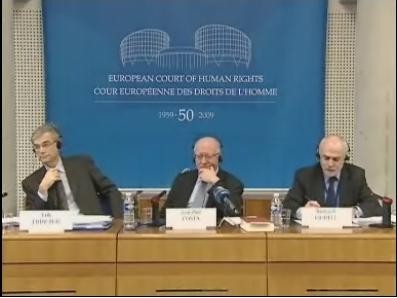
ECHR's President to "EuroFora" on Journalists Gongadze and Adali murders : Principles must apply to all States, without discrimination.
+ ECHR's Statistics on Freedom of Expression (See below).
European Court of Human Rights' President, Jean-Paul Costa, questioned by "EuroFora" on Journalists' murders, as in Gongadze and Adali's cases etc., strongly stressed all CoE Member States' obligation to make efficient Investigations to find and punish those responsible, and underlined that ECHR's case-law's principles must apply to all without any discrimination.
His call was clearly supported by various Top MEPs who denounced a risk of "Double Standards" if some Journalists' murders are investigated, while others don't.
To avoid such risks, CoE's Parliamentary Assembly adopted a Resolution, on the occasion of Ukranian Journalist Gongadze's murder, "stressing", as a matter of general Principle, "the importance it attaches to the safety of Journalists and political activists, especially those linked to opposition groups, in ALL member states of the CoE". All "crimes against journalists and political activists must be investigated ... as a matter of priority, without political interference".
Costa was replying to "EuroFora"s question on the fact that, after CoE's Committee of Ministers, also CoE's Assembly had just adopted a Resolution on Gongadze murder case, based on an ECHR's judgement of 2005, asking a full Investigation from Ukraine, who has found and condemned in 10 years of jail 2 executants, but not yet the instigators.
While nothing similar was yet done for dissident Turkish Cypriot Kutlu Adali's murder, with 5 bullets shot at his head out of his Family's home in the territories of Cyprus occupied by Ankara's army, despite another ECHR's judgement of the same year 2005, and despite Turkey's claim that nobody was found among those responsible for the murder, and that there was nothing more to do..
In order to be credible and efficient, CoE's mechanisms shouldn't find a way to at least ask for full investigations of all Journalists' murders anywhere they might be committed, without exceptions ?
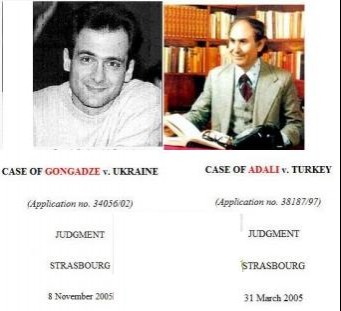
- "On the larger question that you raised, I'd like to say, since we are in a period of stock-taking on ECHR's 50 Years, that the Court's case-law developed certain concepts ....such as the Positive obligations of States, part of which are also the procedural obligations", started to reply ECHR's President.
- "Whenever Journalists, Lawyers, Defenders of Human Rights, or even simple Citizens are murdered, the States are held responsible, not only if its their own security forces' agents who committed these murders, but also if they didn't make sufficiently substantial and efficient Investigations", he stressed.
- "I want to strongly underline that we (ECHR) have found in many cases numerous violations of Articles 2 and 3 against States, ....(about) murders or torture, ...because they didn't make enough Investigations in order to try to find and punish those responsible".
- "We (ECHR) do that vis-a-vis all 47 (CoE) Member States, without any discrimination".
"Naturally, the circumstances in each particular case may be differend, and we can't ommit to apply the rules of proof, or the rules of criminal procedure".
"But we try, by all means, to apply these principles of our case-law, to all States", he concluded.
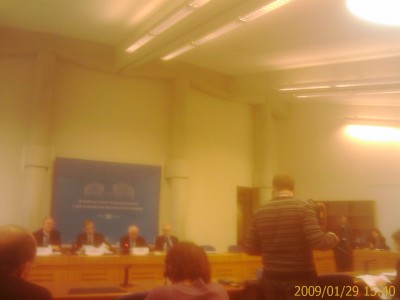
Costa's call was strongly supported by several Top CoE MEPs, from various Political areas
- "To investigate the murder of one Journalist, and not of another, looks like Double Standards", denounced the President of EuroLeft Group in CoE's Assembly, Dutch MEP Tiny Cox.
- "What is the reason ? Politics or specificity of a case ? Of course, if Cyprus and Turkey are involved, it's always a Political case"..
- "Murders of Journalists should always be fully investigated, because killing Journalists is not only killing persons, but also killing Free Press". "We (CoE's Assembly) should do our outmost to help People who are working on Free Press and they are under threat or murdered".
Because for Free Politics, Free Press is a pre-requisitive : Parliamentarians cannot function without a Free Press. Not investigating, is not protecting ourselves".
So we should investigate all Journalists' murders : We are talking about Gongadze, about the Cypriot man (Adali), about the Journalist murdered in Moscow one week ago, etc", Cox concluded
- "CoE can' look at these cases differently. CoE can't wear Blinckers !".
- "If the one is investigated, so has to be also the other. Why there wasn't full investigation ? Why's that ?", wondered British Socialist MEP, Alan Meale.
- "A good idea" would be to "make a Motion for Resolution", and "join all Journalists' murders. Adali and Gongadze etc", said to "EuroFora" EU Parliament Political affairs Committee's President, Goran Lindbland, ChristianDemocrat MEP from Sweden.
(See also earlier News at "EuroFora" on similar issues).
-------------------------------
ECHR's Statistics on Freedom of Expression :
Almost Half of condemnations by ECHR for violations of Freedom of Expression in 2008, concern Turkey : 20 out of a total of 48 for all CoE's Member States.
Russia, Poland, France and Moldova were condemned only 3 times. Romania, Greece, Portugal, 2 times, and the other CoE Member States only 1 time, or none.
--------------------
During the last Decade : 1998 - 2008, Turkey was condemned for violating Freedom of Expression in ..169 cases, while Austria only in 24.
France and Moldova in 14 and 13, respectively, closely followed by Russia and Poland with 11 and 10, respectively. The rest of CoE Member States had less than ten condemnations.













